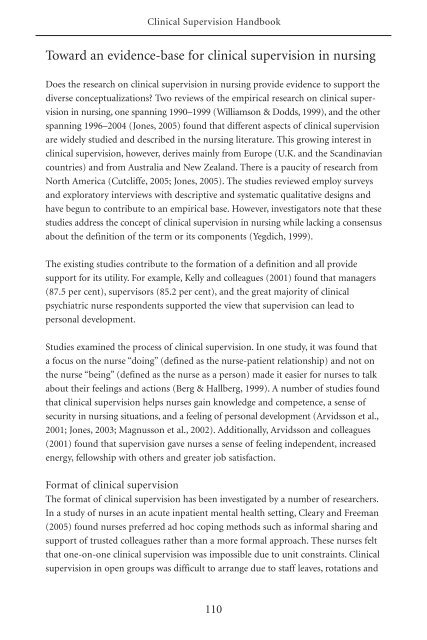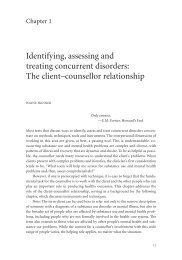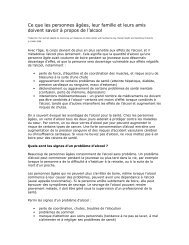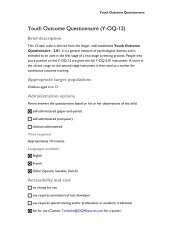Clinical Supervision Handbook - CAMH Knowledge Exchange ...
Clinical Supervision Handbook - CAMH Knowledge Exchange ...
Clinical Supervision Handbook - CAMH Knowledge Exchange ...
Create successful ePaper yourself
Turn your PDF publications into a flip-book with our unique Google optimized e-Paper software.
<strong>Clinical</strong> <strong>Supervision</strong> <strong>Handbook</strong><br />
Toward an evidence-base for clinical supervision in nursing<br />
Does the research on clinical supervision in nursing provide evidence to support the<br />
diverse conceptualizations? Two reviews of the empirical research on clinical supervision<br />
in nursing, one spanning 1990–1999 (Williamson & Dodds, 1999), and the other<br />
spanning 1996–2004 (Jones, 2005) found that different aspects of clinical supervision<br />
are widely studied and described in the nursing literature. This growing interest in<br />
clinical supervision, however, derives mainly from Europe (U.K. and the Scandinavian<br />
countries) and from Australia and New Zealand. There is a paucity of research from<br />
North America (Cutcliffe, 2005; Jones, 2005). The studies reviewed employ surveys<br />
and exploratory interviews with descriptive and systematic qualitative designs and<br />
have begun to contribute to an empirical base. However, investigators note that these<br />
studies address the concept of clinical supervision in nursing while lacking a consensus<br />
about the definition of the term or its components (Yegdich, 1999).<br />
The existing studies contribute to the formation of a definition and all provide<br />
support for its utility. For example, Kelly and colleagues (2001) found that managers<br />
(87.5 per cent), supervisors (85.2 per cent), and the great majority of clinical<br />
psychiatric nurse respondents supported the view that supervision can lead to<br />
personal development.<br />
Studies examined the process of clinical supervision. In one study, it was found that<br />
a focus on the nurse “doing” (defined as the nurse-patient relationship) and not on<br />
the nurse “being” (defined as the nurse as a person) made it easier for nurses to talk<br />
about their feelings and actions (Berg & Hallberg, 1999). A number of studies found<br />
that clinical supervision helps nurses gain knowledge and competence, a sense of<br />
security in nursing situations, and a feeling of personal development (Arvidsson et al.,<br />
2001; Jones, 2003; Magnusson et al., 2002). Additionally, Arvidsson and colleagues<br />
(2001) found that supervision gave nurses a sense of feeling independent, increased<br />
energy, fellowship with others and greater job satisfaction.<br />
Format of clinical supervision<br />
The format of clinical supervision has been investigated by a number of researchers.<br />
In a study of nurses in an acute inpatient mental health setting, Cleary and Freeman<br />
(2005) found nurses preferred ad hoc coping methods such as informal sharing and<br />
support of trusted colleagues rather than a more formal approach. These nurses felt<br />
that one-on-one clinical supervision was impossible due to unit constraints. <strong>Clinical</strong><br />
supervision in open groups was difficult to arrange due to staff leaves, rotations and<br />
110

















